Table of Contents
Introduction
If your dog is struggling with chronic vomiting, soft stools, or unexplained weight loss, you’re not alone, and the cause may be more than just a food sensitivity. While food allergies in dogs are common, IBD in dogs (inflammatory bowel disease) is a more serious condition that often goes undiagnosed for months. As a veterinarian, I’ve seen many pet owners misled by the overlap in symptoms. But there are critical differences. In this article, you’ll learn five essential clues that can help you and your vet determine whether your dog is dealing with IBD rather than just reacting to a food ingredient. Catching it early can mean faster relief and better long-term outcomes for your dog.
Medical Disclaimer:
This article is for informational purposes only and does not substitute professional veterinary advice. Always consult your veterinarian before starting any diagnostic or treatment plan for your pet.
🐾 Key Takeaways: IBD vs Food Allergy in Dogs
- IBD in dogs is a chronic inflammatory condition of the gut, while food allergies involve an acute immune response to specific proteins.
- Both conditions share signs like diarrhea and vomiting, but IBD typically doesn’t respond to basic diet changes alone.
- Dogs with IBD often need biopsies and medical therapy, whereas food-allergic dogs may improve quickly on a strict elimination diet.
- Clue #1: IBD symptoms persist longer and don’t fully resolve with diet changes.
- Clue #2: A poor response to hydrolysed or novel diets often suggests IBD.
- Clue #3: Bloodwork abnormalities like low albumin or cobalamin are more common in IBD.
- Clue #4: Biopsy results show intestinal inflammation in IBD.
- Clue #5: IBD often requires immunosuppressants or anti-inflammatories, unlike food allergies.
What Is IBD in Dogs?
You can also see: https://doglifeexpert.com/7-expert-backed-truths-about-canine-epilepsy/
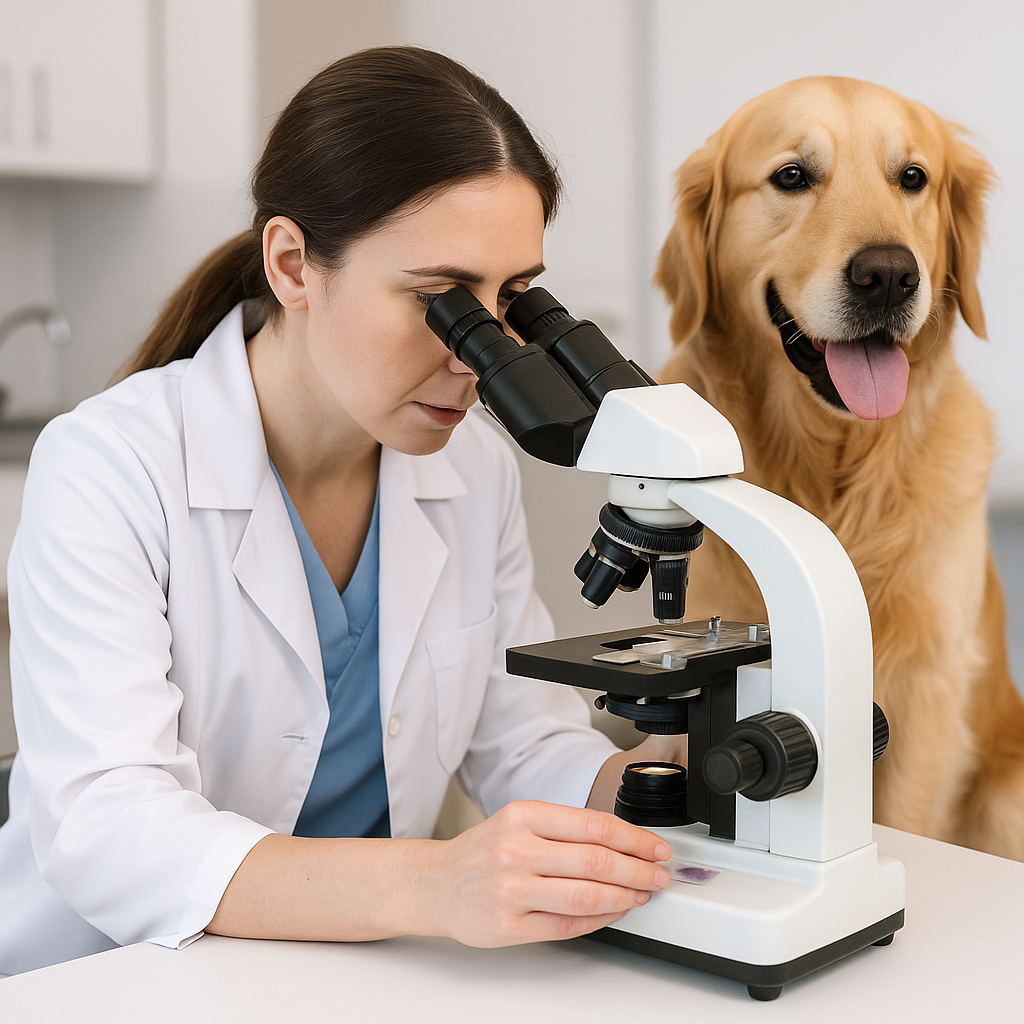
Inflammatory bowel disease (IBD) in dogs is not a single disease, but a group of chronic conditions that cause inflammation of the gastrointestinal (GI) tract. This inflammation disrupts digestion and nutrient absorption, leading to symptoms like persistent diarrhea, vomiting, gas, and weight loss.
Veterinarians typically diagnose IBD in dogs after ruling out infections, parasites, neoplasia, or dietary intolerance. Definitive diagnosis requires tissue samples obtained via endoscopy or surgery. These biopsies help identify the type of immune cell infiltration, usually lymphoplasmacytic, eosinophilic, or granulomatous inflammation, which guides treatment decisions.
Current research suggests that canine IBD stems from a complex interplay of genetic factors, immune dysregulation, and gut microbiome imbalance. One review in the National Library of Medicine emphasizes the role of intestinal barrier dysfunction and abnormal immune responses to gut bacteria or dietary antigens.
Unlike food allergies, which usually provoke a rapid immune reaction, IBD in dogs develops slowly over weeks or months and often requires a multimodal treatment plan.
5 Crucial Clues Your Dog Has IBD—Not a Food Allergy
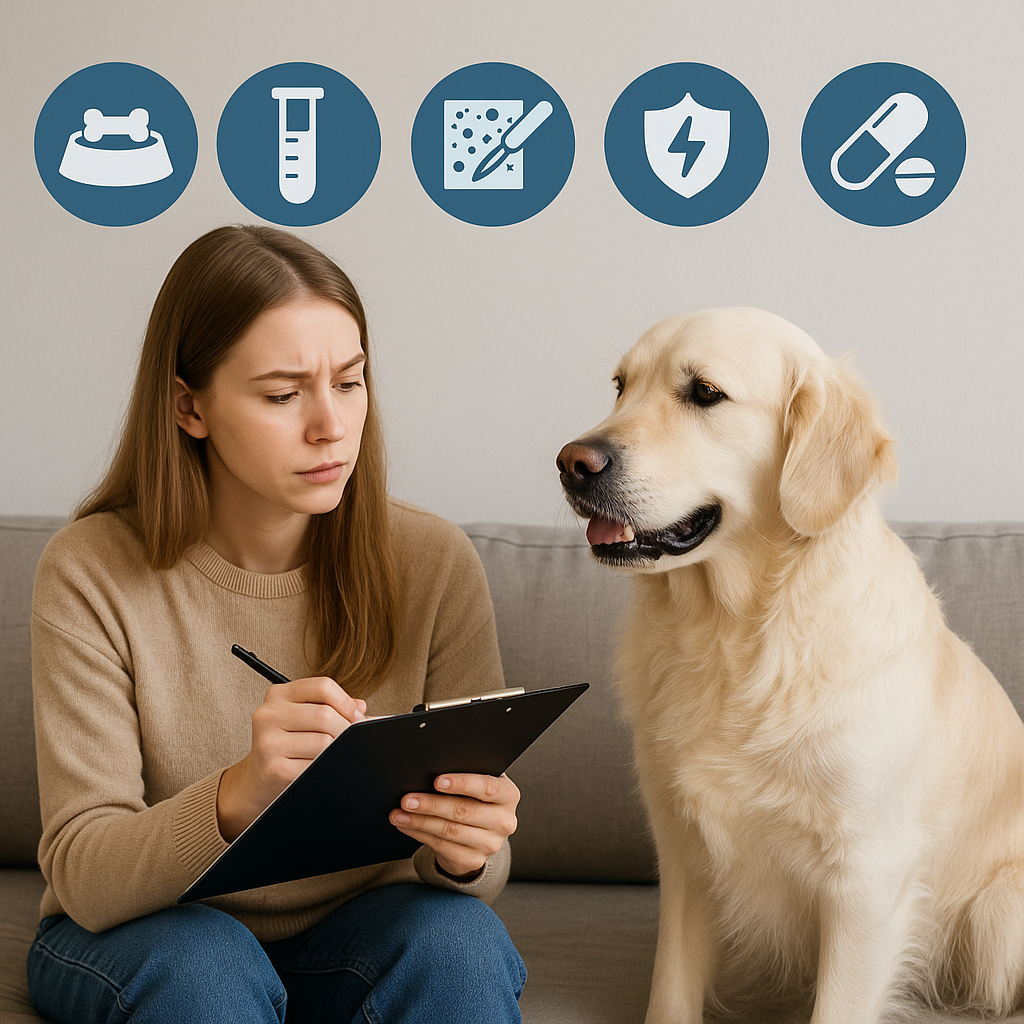
1. Symptoms Don’t Improve After 4–6 Weeks on a Strict Elimination Diet
Food-responsive enteropathy usually improves within a month when a dog is placed on a strict hydrolysed or novel protein diet. According to the Purina Institute, clinical signs often resolve in 1–4 weeks with proper dietary changes.
However, dogs with IBD often show partial or no improvement, especially if there’s underlying immune-mediated inflammation. If your dog has been on a properly controlled diet and is still having frequent GI upset, that’s a strong clue it’s more than a food sensitivity.
2. Relapses Occur Even With “Safe” Diets
Unlike food allergies, which typically resolve once the offending protein is eliminated, IBD in dogs is often unpredictable. Flare-ups may occur even when your dog is eating a previously tolerated hydrolysed or limited ingredient diet.
A 2004 study on soy hydrolysate diets found that while some IBD cases responded well to diet alone, many relapsed or required further therapy. This inconsistency is one of the key differences from food allergies.
3. Blood Tests Show Abnormal Markers Like Low Albumin or Cobalamin
Bloodwork can offer vital clues. Dogs with IBD often have hypoalbuminemia (low blood protein) or hypocobalaminemia (low vitamin B12), both of which reflect chronic intestinal inflammation and malabsorption.
These lab abnormalities are rarely seen in uncomplicated food allergies. So, if your vet finds these markers during diagnostics, it adds weight to an IBD diagnosis. As Cornell University’s Veterinary School explains, these deficiencies often indicate more severe, chronic gut disease.
4. Endoscopy or Biopsy Confirms Gut Inflammation
Food allergies are typically diagnosed through diet trials and symptom resolution. By contrast, IBD in dogs often requires tissue biopsies to confirm. Endoscopic or surgical sampling can reveal the presence of inflammatory infiltrates and also help differentiate between types, such as eosinophilic or lymphoplasmacytic IBD.
If your dog’s condition leads your vet to recommend a biopsy, it’s because they suspect a deeper, chronic pathology, not just a dietary issue. The Overland Park Veterinary Specialists note that biopsy remains the gold standard for definitive IBD diagnosis.
5. Immunosuppressive Drugs Are Required for Long-Term Control
While food allergies can often be managed with diet alone, IBD in dogs frequently needs medical therapy. These may include corticosteroids (like prednisone), immunosuppressants (such as cyclosporine or azathioprine), or anti-inflammatory drugs like mesalazine.
A study published on ResearchGate discusses how many IBD cases don’t respond to diet alone and require pharmacologic intervention. Long-term treatment plans may also involve probiotics, omega-3s, and vitamin supplementation to maintain remission and gut health.
Why IBD and Food Allergies Are So Often Confused
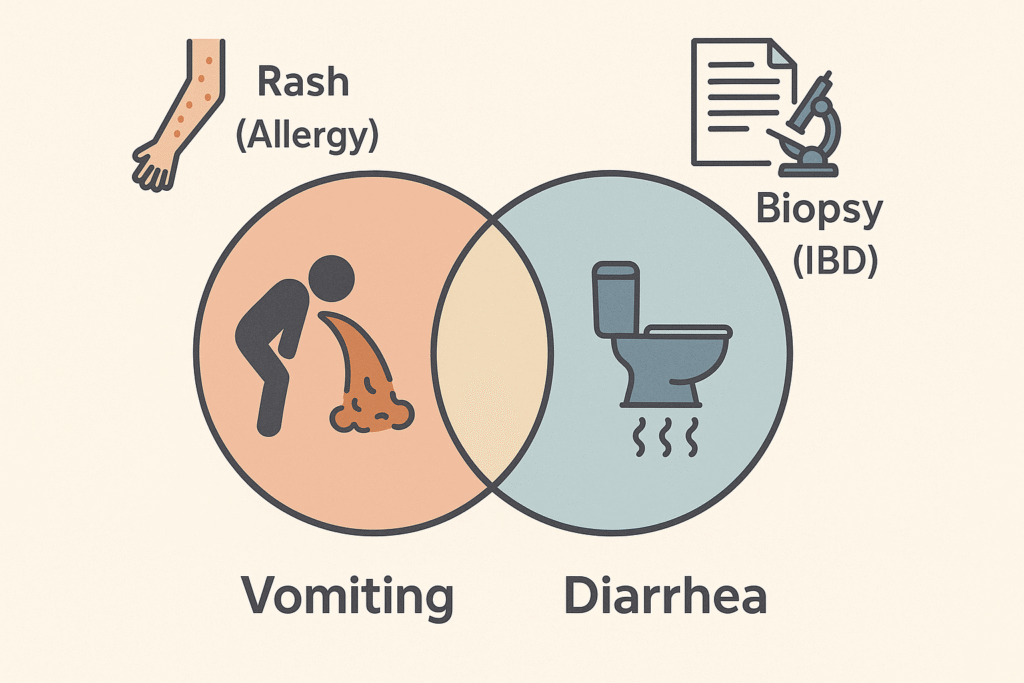
It’s easy to see why many pet owners and even some vets, early in the diagnostic process, confuse IBD in dogs with food allergies. Both conditions share hallmark signs like vomiting, soft stools, weight loss, and intermittent appetite changes. But beneath these surface symptoms, the diseases operate very differently.
Overlapping Clinical Signs
Chronic diarrhea and vomiting are seen in both conditions. Flatulence, bloating, and even mucus in the stool can appear whether the underlying cause is dietary or inflammatory. Many dogs with IBD initially respond to dietary changes, leading owners to mistakenly believe food allergy is the issue, until symptoms return.
Gut Barrier Dysfunction in Both Conditions
A scientific review on intestinal barrier integrity shows that gut permeability (“leaky gut”) and dysbiosis (microbial imbalance) are found in both food-responsive enteropathies and canine IBD. This means that inflammation may allow food antigens to penetrate and trigger reactions, blurring the diagnostic line even further.
Dual Diagnosis Is Possible
Some dogs truly have both: a primary food allergy compounded by underlying IBD or vice versa. This is why most veterinarians begin with an elimination diet trial; it helps rule out simpler causes before moving to more invasive testing. But if symptoms persist despite perfect dietary adherence, IBD in dogs becomes the most likely explanation.
What Dog Owners Can Do at Home
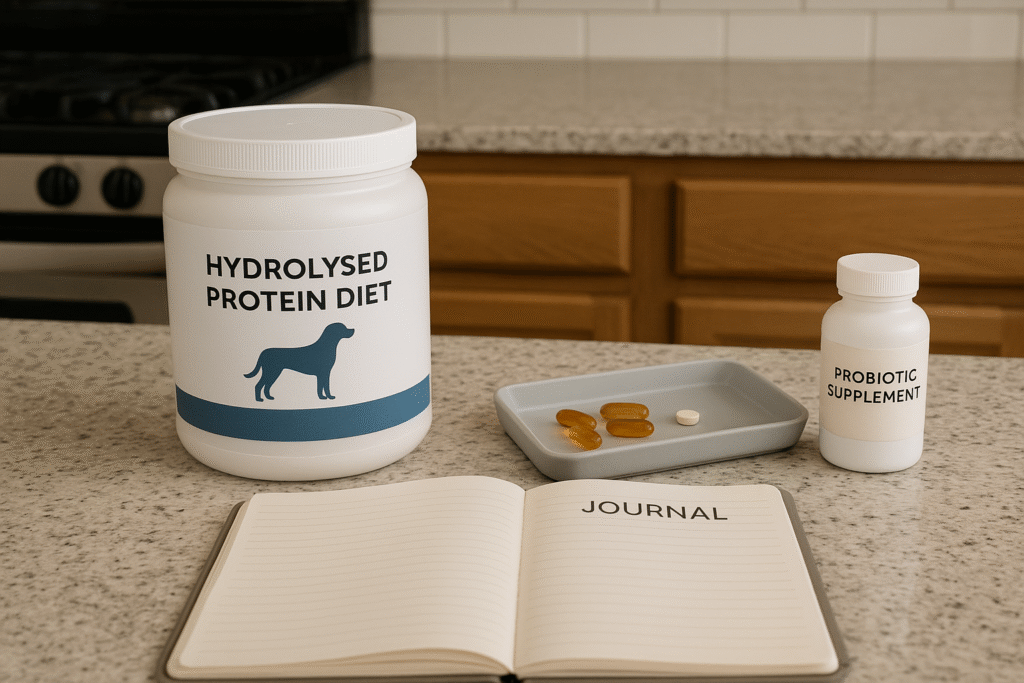
As a pet owner, your role is vital in helping your veterinarian identify whether your dog’s symptoms point to IBD or a food allergy. Observation, consistency, and documentation are key. Here’s how you can make a difference from day one.
✅ 5-Minute Symptom Tracking Checklist
Spend a few minutes daily tracking signs using a journal or app. Note:
- Frequency and consistency of stools
- Any vomiting (colour, timing, undigested food)
- Appetite changes or picky eating
- Weight loss or bloating
- Skin symptoms (e.g., itching, hives, more likely in allergies)
- Response to diet change over time
A sharp decline or no improvement after 4–6 weeks on a strict diet strongly suggests IBD in dogs rather than a food allergy.
✅ Talk to Your Vet About Elimination Diets
Before jumping to medications or biopsies, your vet may recommend an elimination diet trial. These use either hydrolysed protein diets (which break proteins down into non-reactive fragments) or novel proteins your dog has never eaten (e.g., kangaroo, rabbit).
Follow this plan to the letter—no treats, table scraps, or dental chews with unknown ingredients. As the Veterinary Evidence review explains, even trace exposure to allergens can skew results.
If there’s no improvement after the trial or symptoms worsen, discuss testing for IBD in dogs via bloodwork, imaging, and possibly biopsy.
✅ Long-Term Dietary Management
Whether your dog is eventually diagnosed with IBD or food allergy, diet remains central to ongoing care. Resources like the Cornell Riney Canine Health Center offer guidance on:
- Formulating balanced home-prepared diets
- Choosing appropriate commercial diets
- Adjusting feeding plans over time
Dogs with IBD may do best on long-term low-residue, easily digestible diets along with gut-supportive therapies like probiotics, omega-3 fatty acids, or fibre blends.
Summary Table: 5 Crucial Clues It’s IBD, Not a Food Allergy
| Clue | IBD in Dogs | Food Allergy |
|---|---|---|
| 1. Diet Trial Response | Poor or partial response to hydrolysed/novel diets | Symptoms usually improve in 1–4 weeks on a strict elimination diet |
| 2. Relapses on “Safe” Foods | Flare-ups occur even on previously tolerated diets | Stable once the allergen is removed and the diet is controlled |
| 3. Bloodwork Findings | Abnormal albumin, low cobalamin, and signs of malabsorption | Typically normal labs unless secondary issues are present |
| 4. Biopsy Results | Inflammatory infiltrates confirmed on endoscopy or biopsy | Not usually performed; not needed for diagnosis |
| 5. Required Treatments | Often needs steroids, immunosuppressants, or gut medications | Managed through diet alone in most cases |
This table reflects years of clinical experience and aligns with data from the AVMA Journal, Purina Institute, and peer-reviewed veterinary literature.
Frequently Asked Questions (FAQs)
1. Can a dog have both IBD and a food allergy?
Yes. It’s not uncommon for dogs to suffer from both IBD and dietary sensitivities. A dog with IBD may initially respond to an elimination diet, but experience relapses or incomplete resolution, suggesting a deeper inflammatory issue. In these cases, diet helps manage symptoms, but additional therapies are needed.
2. Are certain breeds more prone to IBD in dogs?
Yes. Breeds like German Shepherds, Boxers, Soft-Coated Wheaten Terriers, and French Bulldogs have a higher genetic risk for canine IBD. These breeds may show signs earlier in life and sometimes respond differently to treatments.
3. How long should I try a diet trial before assuming it didn’t work?
Typically, a strict elimination diet should be followed for at least 4 to 6 weeks with no treats or dietary deviations. If your dog hasn’t improved significantly in that time, or if GI signs worsen, your vet may suspect IBD in dogs and recommend further diagnostics.
4. Are over-the-counter limited ingredient diets enough?
Not usually. Many over-the-counter diets have cross-contamination with common proteins. For accurate diagnosis and symptom resolution, it’s best to use prescription hydrolysed or novel protein diets under veterinary supervision.
5. Is IBD in dogs curable?
Unfortunately, IBD in dogs is not considered curable, but it is manageable. With the right combination of diet, medication, and supportive care, many dogs live full and comfortable lives. Treatment is often lifelong and adjusted based on symptom control.
Final Thoughts
Distinguishing between a simple food allergy and IBD in dogs can be tricky, but getting it right can make all the difference in your pet’s comfort and long-term health. While both conditions affect the gut, they’re driven by entirely different mechanisms and require unique treatment approaches.
If your dog hasn’t improved after a well-controlled diet trial or is experiencing recurring flare-ups, weight loss, or abnormal bloodwork, it’s time to talk to your vet about inflammatory bowel disease. Diagnostic tests like endoscopy or biopsy can be intimidating, but they offer valuable clarity and help your dog get the targeted treatment they need.
In my practice, I’ve seen dogs with canine IBD go from lethargic and malnourished to thriving again, once we identified the right balance of medication, diet, and support. With patience, documentation, and partnership with your veterinary team, your dog can live a full, vibrant life despite a chronic GI condition.

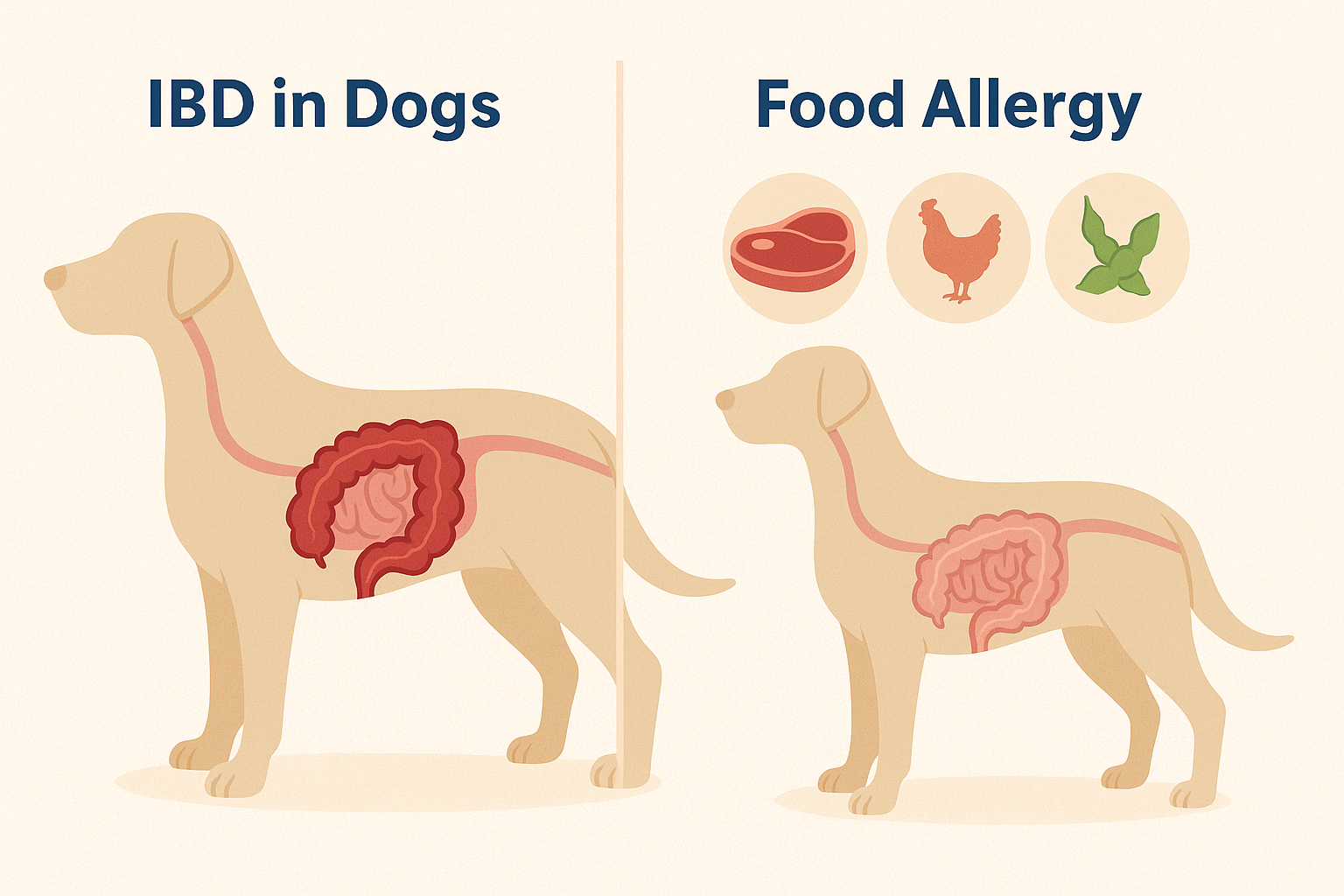



Pingback: Dog Leptospirosis Vaccine: 2024 Essential Guide to Risks & Rules